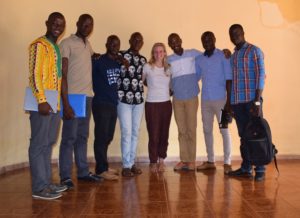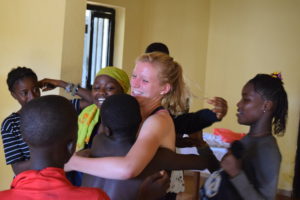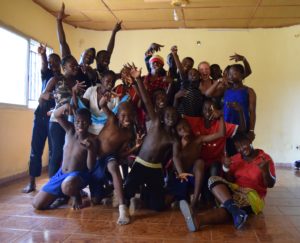Just like that, one of the most incredible months of my life is drawing to a close! Guinea has welcomed me so warmly that it is nearly impossible to think of leaving again so soon. Luckily, my heart is full to bursting with memories, learning, and love for this country, so it will certainly stay with me as I move on to my next adventure!
In my last few days here, I’ve been working hard to compile all of the research work that I’ve done, look back on it as a whole, and gleam from it all of the insights and learning that it offers. I think it is perfectly fitting, then, that after 11 different qualitative interviews on school success in Guinea, one of the main themes that emerged was the necessity of bringing critical thinking into Guinean schools and student mentalities, and many of our experts described this kind of thinking as “the ability to analyze and summarize.” I suppose it makes total sense that the way I’m learning that, processing it and taking it away with me in a meaningful context, is exactly through that very process of “summarizing and analyzing”.
Anyways, putting my summarizing and analyzing skills to work as best I could, I used the final three interviews I conducted this week – with a school teacher, a Guinean education expert, and a project manager from the International Organization for Migration in Guinea – to reflect on the information we’ve gathered. The beauty of analyzing and summarizing, I suppose, has been being able to find the common elements and use them to create a picture of the education situation in Guinea. As that picture has formed, I’ve begun to see where the MindLeaps skills fit in to it.
As I see it (keep in mind, I’m still learning and not at all an expert), the traditional Guinean school system as it stands – a more lecture and repetition based learning environment – requires four of the MindLeaps skills in particular for success: Memorization, Language, Discipline, and Grit. The work that is being done now at the national educational level to change that system and move towards a more creative and constructive learning environment, and the future of these children that extends beyond their days in the classroom, will require the addition of MindLeaps’ other life skills: teamwork, creativity and confidence. I found it really heartening to hear experts talk about the way those particular skills would help children outside of school and after school “in the real world”. Further themes and new ideas that arose from these interviews, such as critical thinking (analyzing and summarizing!) and the ability to trust, continued to broaden my horizons in terms of both learning about childhood development and education, and the capacity of dance to teach us those things. It’s been a huge month of learning, for sure!
Another interesting opportunity to put my own critical thinking skills to use this week was when we tried out the intake questionnaire, which we’ve been actively testing and revising all month with the existing MindLeaps kids, on a new cohort of kids from the community who have not been in contact with MindLeaps before. I was really nervous going into it because this was a setting in which no existing trust or relationship had been built between us and the kids. I was worried that the questions we had worked so hard fine-tuning would not get us the same level of information or story in that context, and our tool would not be broadly applicable for future kids. Luckily, the interviews actually went increasingly well, and there was some real satisfaction in observing how the changes we had made to this tool truly navigated linguistic, social and cultural factors and made discussion possible. It has been an extensive process, but is really a triumph to ask questions about how a child finds food or where they sleep and really feel their story begin to unfold before you.

Julia with the MindLeaps’ staff
It has also been particularly important to pay attention to the way we ask kids about more difficult questions, and learn from and analyze their responses. This is particularly salient when we ask questions related to parents who have passed away and the impact this has had, and developing strategies to build comfort, trust, honesty and rapport in the face of such difficult truths are crucial.
As such, meeting with the community kids was also quite an emotional experience. Hearing children talk about losing parents and being fostered and displaced, or describe the experience of never having been to school and collecting and selling stones to make money – has been touching and transformative in a lot of ways. Hearing one young girl talk about staying up all night when it rains to bail water out of her “house” with a bucket because she and her grandmother live in an unfinished construction site, was almost more than my heart could hold. And yet, it drives home again and again for me the importance of this work, who it is for, and who it can impact.
It is promising to see that our tool is an appropriate starting point for getting to know and being able to help these vulnerable and beautiful kids. Finally, whenever I am getting a bit weighed down by these heavy and heart-wrenching stories, all I need to do is peep out of the office door at our current group of dancing kids, and be awash in the feeling of hope that all of their potential brings. On my final day dancing with the kids, seeing the progress that they have made and the MindLeaps skills they have nurtured in just three weeks this summer was the absolute biggest source of joy – and is the memory that I’m sure will stick with me the most strongly once I am gone.
It pains me to know that I won’t be around to see where that potential will take them, but I’m so ridiculously glad I was here to witness them being drawn into the power of dance and begin developing and growing through it. My month with MindLeaps has been truly phenomenal and inspiring in ways I cannot even begin to describe, and I am so grateful to everyone at MindLeaps for allowing me to be here and experience this privileged glimpse into their work in Guinea. Thank you, MindLeaps!
Julia Sawatzky, originally from Edmonton, Canada, is a medical student at the University of St. Andrews in Scotland. She is volunteering with MindLeaps Guinea in June-July 2017 as part of a university scholarship program.

